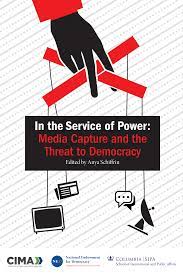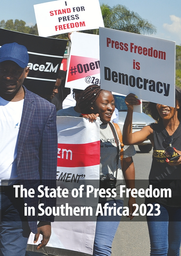For years, industry, governments, and civil society have grappled with how to address the potential harm from state media while protecting people’s right to information in the digital domain, note META’s Lindsay Hundley, Yvonne Lee, Olga Belogolova, and Sarah Shirazyan.
In some cases, the harm from state media can be significant, they write for Lawfare:
State media outlets have published stories that spread conspiracy theories, deny human rights abuses, and exacerbate political divides. Because internet platforms enable these outlets to grow their audiences—including among those unaware of the government’s influence on their content—some favor restricting state media online. But such restrictions can also be harmful. They can infringe on peoples’ right to information as well as limit their ability to access news about local developments that directly affect their daily lives.
 Media capture is a form of governance failure that occurs when the news media advance the commercial or political concerns of state and/or non-state special interest groups controlling the media industry instead of holding those groups accountable and reporting in the public interest, says the Center for International Media Assistance (above).
Media capture is a form of governance failure that occurs when the news media advance the commercial or political concerns of state and/or non-state special interest groups controlling the media industry instead of holding those groups accountable and reporting in the public interest, says the Center for International Media Assistance (above).
Addressing state media requires balancing a set of trade-offs. At the core of this challenge is safeguarding democratic principles and people’s “right to seek, receive, and impart information through any media” against mitigating the broader risks posed by government propaganda, the META analysts contend. This can help set the foundation for deeper conversations among academics, industry, civil society, international organizations, and government to collectively develop effective strategies to address state media. RTWT
There are still competing views on how social media platforms such should deal with state-controlled media, but it’s undeniable that this team at @meta has been thoughtful and consultative in designing their approach, CIMA’s Nicholas Benequista tweeted.
There are still competing views on how social media platforms such should deal with state-controlled media, but it’s undeniable that this team at @meta has been thoughtful and consultative in designing their approach. Addressing Media Capture – Lawfare (https://t.co/tVmpDVrEyc)
— Nicholas Benequista (@benequista) May 16, 2023
 The 3rd edition of the State of Press Freedom in Southern Africa Report was launched during the 2nd Africa Media Convention in Lusaka, Zambia on the 11 May 2023, UNESCO reports. The Report was produced by the Media Institute of Southern Africa (MISA) with support from the Swedish Embassy, International Media Support (IMS), the Sigrid Rausing Trust and the National Endowment for Democracy (NED).
The 3rd edition of the State of Press Freedom in Southern Africa Report was launched during the 2nd Africa Media Convention in Lusaka, Zambia on the 11 May 2023, UNESCO reports. The Report was produced by the Media Institute of Southern Africa (MISA) with support from the Swedish Embassy, International Media Support (IMS), the Sigrid Rausing Trust and the National Endowment for Democracy (NED).
USAID’s BMAP Forward 2023 Annual Media Forum in Sarajevo addressed pressing topics affecting independent media in the region, including threats to freedom of speech, emerging trends in the region’s media and advertising markets, new business models, and the evolution of audience-driven publishing, Internews reports:
Speakers included legal experts from the region and representatives from USAID’s Media Viability Accelerator and Reporters Shield projects, SmartOcto, International Press Institute, I&F Group, FilmAid and international donors and investors, including the Media Development Investment Fund (MDIF), Deutsche Gesellschaft für Internationale Zusammenarbeit (GiZ), European Endowment for Democracy and the National Endowment for Democracy.







